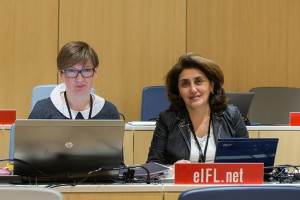Discussion of the internationalization of copyright limitations and exceptions, such as expanded exceptions to copyright for libraries, educational institutions, and people with disabilities, continue this week at the World Intellectual Property Organization (WIPO)’s Standing Committee on Copyright and Related Rights.
Discussions of access provisions in international copyright have been ongoing since 2004 and have, so far, resulted in the establishment of the 2013 Marrakesh Treaty to Facilitate Access to Published Works for Persons Who Are Blind, Visually Impaired or Otherwise Print Disabled. Today’s discussions focused on building on the work done under the Marrakesh Treaty to see the possible establishment of an international instrument internationalizing copyright limitations and exceptions for libraries and archives. International provisions are necessary because, as I note in chapter 4 of my book, International Copyright and Access to Knowledge (Cambridge UP, 2016):
One focus of today’s WIPO discussions was on the topic of orphan works, or copyright works where the copyright owner can’t be found. Libraries and archives are often the “adoptive parents” of orphan works; they are in a position to facilitate access to these works, especially through digital means. However, copyright regimes often stand in the way, as can differing national regimes. The International Federation of Library Associations and Institutions (IFLA), which is active at the meetings, notes that:
Current proposals that are on the table for orphan works (see page 34-39 of the current working document) would allow entities such as libraries to reproduce, make available to the public, and otherwise use orphan works. Some proposals apply these provisions, as well, to retracted works (African Group, Equador, India), and some would require remuneration to authors or copyright owners who are subsequently identified (Equador). However, there is no consensus among states on such proposals, with the United States and the European Union among the key detractors.IFLA is asking for “changes which would give libraries the right to work across borders, to give access to orphan works, and to import books which are available in other countries.” For them, “the goal – an international framework which frees up libraries and librarians – is worth the effort.” After all, IFLA explains, “it’s through exceptions and limitations to copyright that we can do our job.”
The chair’s summary of today’s discussion is expected to be disseminated tonight.
Tomorrow’s discussions are expected to focus on the internationalization of exceptions and limitations for educational and research institutions and for persons with other disabilities.
For those following the discussion, a number of groups are blogging and tweeting from WIPO:
- WIPO webcasts the meeting live
- WIPO posts pictures from the meeting on flickr
- Follow the #SCCR32 hashtag on twitter
- Knowledge Ecology International is blogging the meetings
- The International Federation of Library Associations and Institutions (IFLA) is tweeting from the SCCR
- IFLA held a side-event “Shelves to Servers: Digital Content in Libraries and Archives“
- The Electronic Frontier Foundation hosted a side-event on music and copyright with Imogen Heap
My June 2015 post about these negotiations is here.
* Discount code for International Copyright and Access to Knowledge: Bannerman2015


